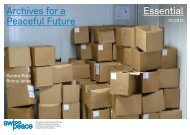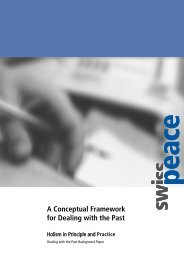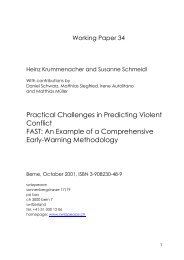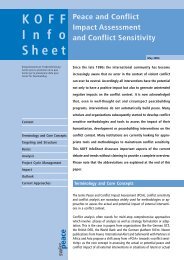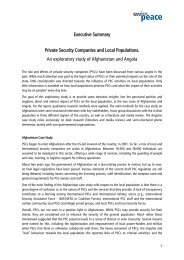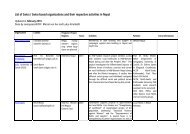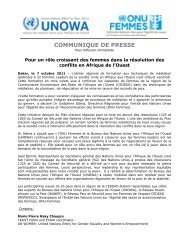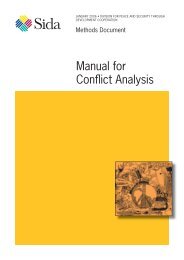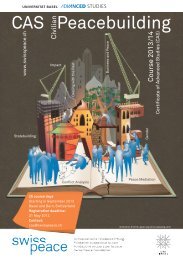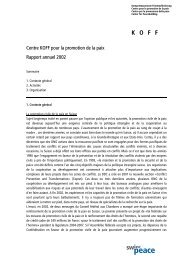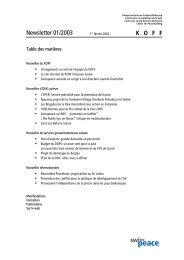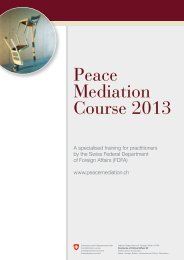English - Swisspeace
English - Swisspeace
English - Swisspeace
You also want an ePaper? Increase the reach of your titles
YUMPU automatically turns print PDFs into web optimized ePapers that Google loves.
Withdrawal from operational activities in<br />
Afghanistan<br />
After four years, swisspeace concluded<br />
its operational activities in Afghanistan in<br />
2005 and handed over the «Afghan Civil<br />
Society Forum» (ACSF) to the Afghanis.<br />
This temporarily marks the end of a successful<br />
Afghan – Swiss cooperation in<br />
peacebuilding activities in Afghanistan.<br />
In the spring of 2002, swisspeace established<br />
the «Afghan Civil Society Forum»<br />
(ACSF) with the goal of ensuring the participation<br />
of Afghan civil society in the<br />
ongoing peace and reconstruction process,<br />
as defi ned in the Treaty of Bonn of<br />
November 27, 2001. Through the establishment<br />
of dialogue forums and conferences<br />
on such topics as «civil society»,<br />
«economic reconstruction», and «the role<br />
of teenagers and women», civil society<br />
was offered an opportunity to infl uence<br />
the peace process.<br />
The basis for democratic elections<br />
From the very beginning, ACSF focused on<br />
the political education of the population.<br />
Through the formation of a national<br />
network of Afghan organizations, ACSF<br />
was able to inform the population on the<br />
draft of the new Afghan constitution; to<br />
encourage the population to co-operate<br />
in and support the consultation process.<br />
In 2004 and 2005, the U.N. mandated<br />
the ACSF to carry out projects parallel<br />
to the presidential and parliamentarian<br />
elections. In 2005, with the support of 15<br />
partner organizations and more than<br />
1,500 trainers, ACSF was able to inform<br />
more than 8.5 million voters on their right<br />
to vote. In less than fi ve months, the train-<br />
ers visited every province twice, i.e. during<br />
the initial registration process and then to<br />
inform the voters of the electoral process.<br />
Unfortunately, this high-risk work led to<br />
the murder of three staff members in the<br />
South-Eastern provinces of Uruzgan,<br />
Helmand, and Paktika (TLO). Furthermore,<br />
staff members were constantly threatened<br />
– verbally and in writing – by the Taliban<br />
and other government opponents.<br />
Tradition and progression<br />
ACSF established a «Tribal Liaison Offi ce«<br />
to deal with traditional tribal structures<br />
as well as modern democratic decisionmaking<br />
procedures for confl ict resolution.<br />
The «Tribal Liaison Offi ce» is primarily<br />
active in the South Eastern part of<br />
the country. It mediates between traditional<br />
tribes, the central government in<br />
Kabul, and international players. It assists<br />
tribes in obtaining project funding, provides<br />
information on the security situation<br />
in the region, and carries out research on<br />
state formation and management. Due<br />
to close cooperation with tribal leaders,<br />
the share of women who register to vote<br />
was increased signifi cantly. As part of an<br />
evaluation carried out towards the end of<br />
2005, the Heinrich Böll Foundation produced<br />
a 55-minute documentary on the<br />
work of the TLO. This fi lm, «Spingiri – The<br />
White Beards», will be fi nished in the<br />
spring of 2006.<br />
12



